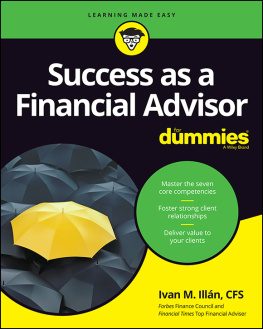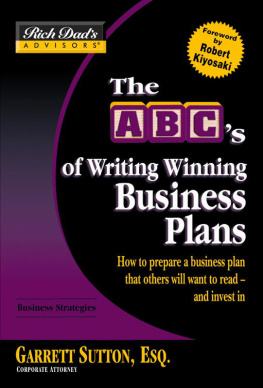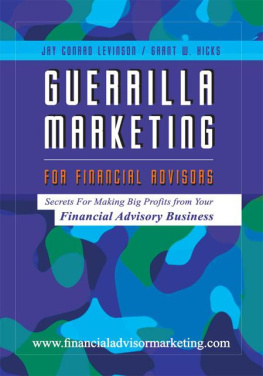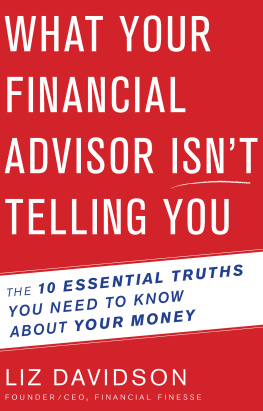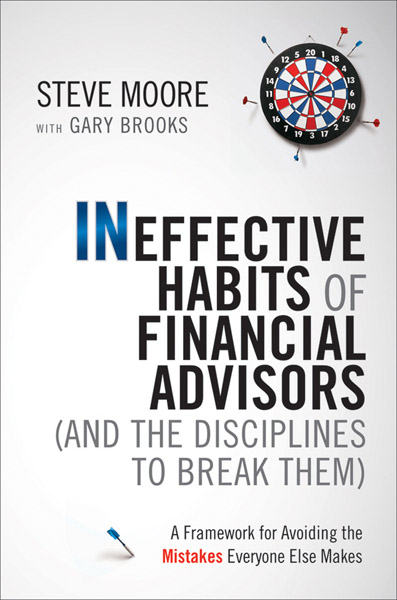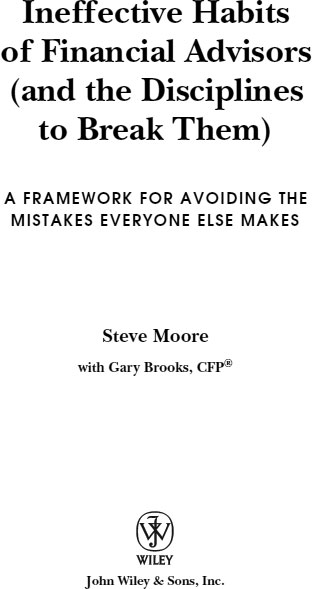Copyright 2011 by Steve Moore and Gary Brooks. All rights reserved.
Published by John Wiley & Sons, Inc., Hoboken, New Jersey.
Published simultaneously in Canada.
No part of this publication may be reproduced, stored in a retrieval system, or transmitted in any form or by any means, electronic, mechanical, photocopying, recording, scanning, or otherwise, except as permitted under Section 107 or 108 of the 1976 United States Copyright Act, without either the prior written permission of the Publisher, or authorization through payment of the appropriate per-copy fee to the Copyright Clearance Center, Inc., 222 Rosewood Drive, Danvers, MA 01923, (978) 750-8400, fax (978) 646-8600, or on the Web at www.copyright.com . Requests to the Publisher for permission should be addressed to the Permissions Department, John Wiley & Sons, Inc., 111 River Street, Hoboken, NJ 07030, (201) 748-6011, fax (201) 748-6008, or online at http://www.wiley.com/go/permissions .
Limit of Liability/Disclaimer of Warranty: While the publisher and author have used their best efforts in preparing this book, they make no representations or warranties with respect to the accuracy or completeness of the contents of this book and specifically disclaim any implied warranties of merchantability or fitness for a particular purpose. No warranty may be created or extended by sales representatives or written sales materials. The advice and strategies contained herein may not be suitable for your situation. You should consult with a professional where appropriate. Neither the publisher nor author shall be liable for any loss of profit or any other commercial damages, including but not limited to special, incidental, consequential, or other damages.
For general information on our other products and services or for technical support, please contact our Customer Care Department within the United States at (800) 762-2974, outside the United States at (317) 572-3993 or fax (317) 572-4002.
Wiley also publishes its books in a variety of electronic formats. Some content that appears in print may not be available in electronic books. For more information about Wiley products, visit our web site at www.wiley.com .
Library of Congress Cataloging-in-Publication Data:
Moore, Steve, 1947
Ineffective Habits of Financial Advisors (and the Disciplines to Break Them) /
Steve Moore, Gary Brooks.
p. cm.
Includes bibliographical references and index.
ISBN 978-0-470-91032-0 (hardback)
1. Investments. 2. Business consultants. I. Brooks, Gary, 1971 II. Title.
III. Title: Ineffective habits of financial advisors (and the disciplines to
break them).
HG4515.M66 2010
332.6dc22
2010027089
This book is dedicated to the most important person in my life, Carol, my wife of 45 years, writing partner, and spell checker.
Foreword
You are going to love this book. If you are reading this book, chances are that it is because you want to improve your performance as a financial advisor. Better still if that desire is coupled with dissatisfaction with the status quo. And even better still if you both recognize the rewards for doing so, and believe those rewards are worth the effort. When that combination is present, transformation is possible. Transformation in your practice, the success and satisfaction of both you and your clients, and positive impact on your practice and your communityall of that can come out of the lessons from this book. There has never been a better time to be an advisoror a better time to build a great advisory practice. Trust is in precious short supply. If you are just beginning in that profession, this book will help you become a good advisor. If you are a good advisor already, it can help you become a great advisorreally.
Whether your desire to improve is motivated by wanting more revenue and profit from your practice, or wanting to enhance the quality and balance of your work and private lives, or driven by a wish to create excellence inside your firm is irrelevant. All of those are solid reasons. But that list leaves out the most powerful reason of all: to adopt habits that foster excellence in your every client interaction. That is what will build lasting trust with your clients, and ultimately telegraph outward to attract an increasingly affluent and loyal client community. And those are just the positive aspects.
The lessons of this book will also help you avert negative experiences common to advisors that often lead to broken client relationships or damaged trustthe consequences of which are bad for the client and bad for the advisor. Often those damaged relationships lead clients to costly and ill-timed bailing out of the market, a type of investment behavior that more than anything else threatens to deprive them of their future financial security. So reading this book will allow you to do well by doing good at the same time. Good deal!
It is a distinct honor to introduce this book. Steve Moore and I have worked together for over a decade, and I have seen firsthand the transformations in advisors that his coaching brings about. I have benefited from his coaching myself, and I can say with certainty that it worksif you apply yourself to it. This is not just what I thinkSteve and I have dozens of clients in common. Of course there are many consultants in the financial advice industry. Some are highly skilled; a few of them are admired, sought after to be quoted in the industry press. But I am aware of none that is equally beloved by his clients. This is because Steve's rare combination of business insight and coaching skill helps people not only come to a recognition of what they need to do to improve their business performancethat's goodbut bring that together with a recognition of why and how to change their behavior. That is great . He helps his clients learn how to win, then to become winnersconsistently.
There is a way to read this book. Bring the edginess of your dissatisfaction and an awareness of what you want to be different, coupled with the suppleness of an open mind, what they call the ``willing suspension of doubt.'' Before diving into this book, I strongly encourage you to think about your current practices: Which ones are you proud of that lead to great interactions? Which do you wish that you could changeones that tend to lead to haphazard or problematic client encounters? If you see that there is sometimes an uncomfortable gap between how you aspire to have clients regard you and how they actually do, here's an opportunity to close the gap.
How can I be so sure? Because I have seen it happen, time and time again. You do not have to be a prodigy to recognize the insights. You do not need to be a paragon of self-discipline to follow the regimen. You do not need magical technology skills to install the processes. Like me, you can be just a regular person. My interactions with the author over more than 10 years taught me two lasting lessons. I earnestly hope you benefit from them as much as I have. The first is the immense valueI would even use the word power that arises from understanding how to convert your dissatisfactions into deliberate behavior that creates advantages for you. Second, I firmly believe that you will discover, as I did, that whatever it is that you think is holding you back from excellence as an investment advisorgloomy economic climate, dipping markets, punitive regulators, narrow-minded bosses, skeptical or mistrusting clients, complex technological changes, whatever that list includesit is not true. It is a falsehood . What holds you back is yourself. Excellence is there for you, within reach. So reach out and grab it.


